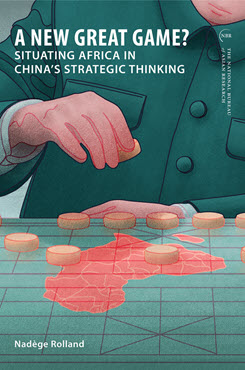NBR Special Report no. 91
A New Great Game? Situating Africa in China’s Strategic Thinking
This new NBR Special Report by Nadège Rolland constitutes the first phase of a two-year project to assess China’s strategic inroads on the African continent. The report situates Africa in Xi Jinping’s strategic vision, describes the instruments that China might use to achieve its objectives, and identifies potential challenges.
EXECUTIVE SUMMARY
MAIN ARGUMENT
Absent from the abundant available scholarship dedicated to China’s growing role and presence on the African continent is a study of whether and how Africa fits into Beijing’s grand strategy, as seen by Chinese strategic thinkers. This report fills this gap. Serious strategic discussions about Africa only began in China after the Chinese leadership adopted a global outlook. Beyond economic engagement and development assistance, Chinese strategists evidently envisage the continent as an essential piece in an escalating geostrategic contest for global influence between China and the U.S.-led West. Beijing’s emerging strategy aims at making the continent fit into a new subsystem comprising much of the “global South” that China aspires to dominate. China’s “new great game” seeks to outflank the U.S. by mobilizing African endorsement of China’s distinctive institutions and governing ideology. To that end, China aims to persuade African countries to adopt aspects of its political and economic system. Contrary to Beijing’s protestations, and despite the skepticism of many Western observers, China is in fact preparing to export its model to Africa and perhaps to other parts of the developing world as well.
POLICY IMPLICATIONS
- China’s competition against the U.S. is not just unfolding in the Indo-Pacific region but at a global level throughout the developing world and specifically on the African continent. As Beijing is preparing to deploy strategies to enhance its influence and presence in African countries, the U.S. strategic community should consider devoting intelligence and analytical resources to deepening its understanding of China’s actions, beyond economic assistance and development aid, in light of Beijing’s strategic objectives.
- While foreign observers are debating whether China is exporting its model overseas, Beijing is evidently striving to encourage African countries to adopt its governance practices in an effort to make them better client states. Robust democratic societies are seen as a major challenge to China’s ability to reach this goal. As part of their response, the U.S. and other liberal democracies should work with African governments and civil society groups to bolster their efforts to build resilient, effective institutions and open societies.
- Although absent from current discussions among Chinese Africanists, military strategists may well be studying the possibility of gaining access to facilities or building new bases on both the eastern and western coasts of Africa. This would improve the People’s Liberation Army’s capacity to project power into the Indian and Atlantic Oceans and could seriously complicate the ability of the U.S. and its allies to maneuver freely in these areas. Such scenarios deserve further study by U.S. military planners and their allied counterparts.
Nadège Rolland is Senior Fellow for Political and Security Affairs at the National Bureau of Asian Research. She is the author of the report “China’s Vision for a New World Order” (2020) and the monograph China’s Eurasian Century? Political and Strategic Implications of the Belt and Road Initiative (2017). She is also editor of the report “An Emerging China-Centric Order: China’s Vision for a New World Order in Practice” (2020).



 Into Africa: China's Emerging Strategy
Into Africa: China's Emerging Strategy
